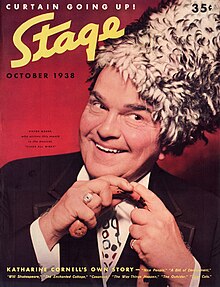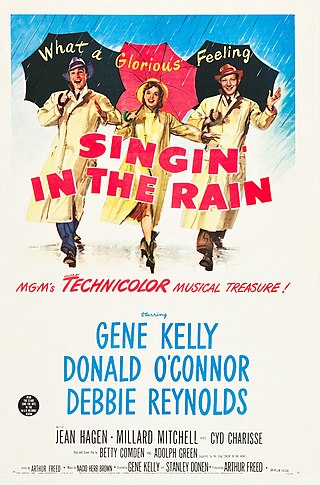
Musical film is a film genre in which songs by the characters are interwoven into the narrative, sometimes accompanied by dancing. The songs usually advance the plot or develop the film's characters, but in some cases, they serve merely as breaks in the storyline, often as elaborate "production numbers".

Mary Virginia Martin was an American actress and singer. A muse of Rodgers and Hammerstein, she originated many leading roles on stage over her career, including Nellie Forbush in South Pacific (1949), the title character in Peter Pan (1954), and Maria von Trapp in The Sound of Music (1959). She was named a Kennedy Center Honoree in 1989. She was the mother of actor Larry Hagman.
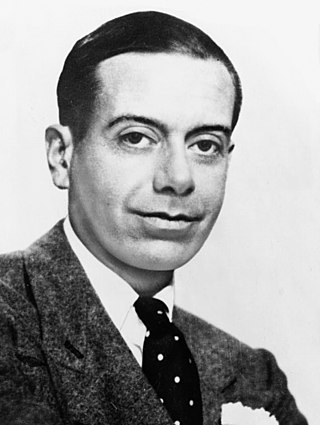
Cole Albert Porter was an American composer and songwriter. Many of his songs became standards noted for their witty, urbane lyrics, and many of his scores found success on Broadway and in Hollywood films.

Kiss Me, Kate is a musical with music and lyrics by Cole Porter and a book by Bella and Samuel Spewack. The story involves the production of a musical version of William Shakespeare's The Taming of the Shrew and the conflict on and off-stage between Fred Graham, the show's director, producer, and star, and his leading lady, his ex-wife Lilli Vanessi. A secondary romance concerns Lois Lane, the actress playing Bianca, and her gambler boyfriend, Bill, who runs afoul of some gangsters. The original production starred Alfred Drake, Patricia Morison, Lisa Kirk and Harold Lang.

Hello, Dolly! is a 1964 musical with lyrics and music by Jerry Herman and a book by Michael Stewart, based on Thornton Wilder's 1938 farce The Merchant of Yonkers, which Wilder revised and retitled The Matchmaker in 1954. The musical follows the story of Dolly Gallagher Levi, a strong-willed matchmaker, as she travels to Yonkers, New York, to find a match for the miserly "well-known unmarried half-a-millionaire" Horace Vandergelder.

Annie Get Your Gun is a musical with lyrics and music by Irving Berlin and a book by Dorothy Fields and her brother Herbert Fields. The story is a fictionalized version of the life of Annie Oakley (1860–1926), a sharpshooter who starred in Buffalo Bill's Wild West, and her romance with sharpshooter Frank E. Butler (1847–1926).

Anything Goes is a musical with music and lyrics by Cole Porter. The original book was a collaborative effort by Guy Bolton and P. G. Wodehouse, revised considerably by the team of Howard Lindsay and Russel Crouse. The story concerns madcap antics aboard an ocean liner bound from New York to London. Billy Crocker is a stowaway in love with heiress Hope Harcourt, who is engaged to Lord Evelyn Oakleigh. Nightclub singer Reno Sweeney and Public Enemy Number 13, "Moonface" Martin, aid Billy in his quest to win Hope. Songs introduced that later became pop and jazz standards are "Anything Goes", "You're the Top", "All Through the Night", and "I Get a Kick Out of You".
Harvey Lester Schmidt was an American composer for musical theatre and illustrator. He was best known for composing the music for the longest running musical in history, The Fantasticks, which ran off-Broadway for 42 years, from 1960 to 2002.

Fifty Million Frenchmen is a musical comedy with a book by Herbert Fields and music and lyrics by Cole Porter. It opened on Broadway in 1929 and was adapted for a film two years later. The title is a reference to the hit 1927 song "Fifty Million Frenchmen Can't Be Wrong" by Willie Raskin, Billy Rose, and Fred Fisher, which compared free attitudes in 1920s Paris with censorship and prohibition in the United States. The musical's plot is consistent with the standard boy-meets-girl plots of musical comedies of the first half of the twentieth century.
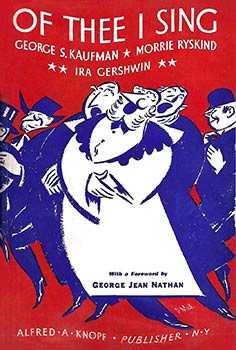
Of Thee I Sing is a musical with a score by George Gershwin, lyrics by Ira Gershwin and a book by George S. Kaufman and Morrie Ryskind. The musical lampoons American politics; the story concerns John P. Wintergreen, who runs for President of the United States on the "love" platform. When he falls in love with the sensible Mary Turner instead of Diana Devereaux, the beautiful pageant winner selected for him, he gets into political hot water.
Forbidden Broadway, known also as Forbidden Broadway, Volume 1, is the first album released by Gerard Alessandrini, the creator of Forbidden Broadway. Because the album features the five cast members from the original show, the album bears the label "Original Cast Recording."
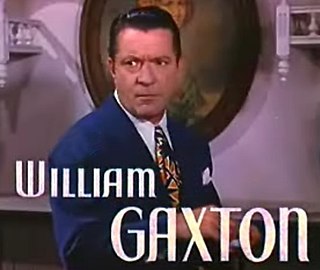
William Gaxton was an American star of vaudeville, film, and theatre. Gaxton was president of The Lambs Club from 1936 to 1939, 1952 to 1953, and 1957 to 1961. He and Victor Moore became a popular theatre team in the 1930s and 1940s; they also appeared in a film together.
The Sound of Musicals was a 2006 four part BBC series starring several different musical theatre actors and some other professional singers who performed acts from different musicals. Each week the standard cast was joined by a celebrity guest host who also performed their favourite numbers. The show also featured interviews with people involved in musical theatre such as Andrew Lloyd Webber, and Cameron Mackintosh.
"My Heart Belongs to Daddy" is a song written by Cole Porter, for the 1938 musical Leave It to Me! which premiered on November 9, 1938. It was originally performed by Mary Martin, who played Dolly Winslow, the young "protégée" of a rich newspaper publisher.

John Francis McMartin was an American actor of stage, film and television.

Night and Day is a 1946 American biographical and musical film starring Cary Grant, in a fictionalized account of the life of American composer and songwriter Cole Porter.
Hollywood Pinafore, or The Lad Who Loved a Salary is a musical comedy in two acts by George S. Kaufman, with music by Arthur Sullivan, based on Gilbert and Sullivan's H.M.S. Pinafore. The work premiered on May 8, 1945, at Ford's Grand Opera House in Baltimore for tryouts. It opened on Broadway at the Alvin Theatre on May 31, 1945, and closed on July 14, 1945, after 52 performances. It was directed by Kaufman and starred Annamary Dickey as Brenda Blossom, Shirley Booth as Louhedda Hopsons, Victor Moore as Joseph W. Porter, George Rasely as Mike Corcoran, William Gaxton as Dick, and Mary Wickes as Miss Hebe. The costumes were designed by Mary Percy Schenck. The adaptation transplants the maritime satire of the original Pinafore to a satire of the glamorous world of 1940s Hollywood film making, but Sullivan's score is retained with minor adaptations.
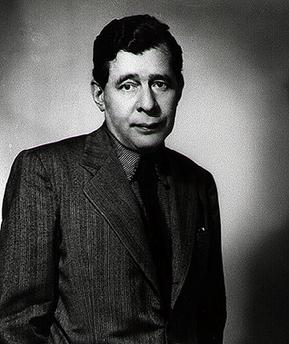
Bella and Samuel Spewack were a husband-and-wife writing team.

Liliane Montevecchi was a French-Italian actress, dancer, and singer.
Happy New Year is a musical with a book by Burt Shevelove and music and lyrics by Cole Porter.

